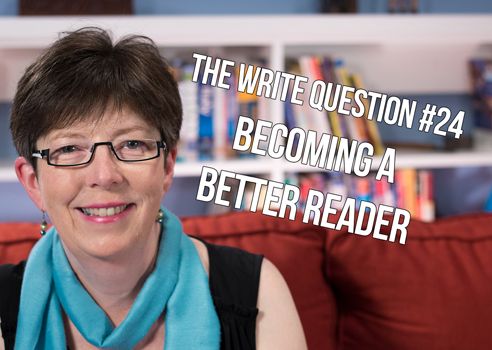Viewing time: 4 mins 29 secs
The Write Question is a weekly video podcast about writing that I started in 2017 and that ran, more or less weekly, until April 2022. This is a republication of issue #24, describing how to become a better reader. The post first ran on July 14/17.
Transcript:
Welcome to The Write Question, the video-podcast designed to answer your questions about writing. I’m Daphne Gray-Grant.
Today I’m answering a question from Joan Rush, a retired lawyer working on her first novel in Vancouver, British Columbia. Here’s her question.
[recording] I have read many new books and reread books that I really like, to use them as writing guides. You suggested that we use writing we like to see if we could follow the author’s style of writing. My problem seems to be that I get engrossed in the stories I am reading and move away from understanding the writing style. I know that sounds stupid, even as I write this, but it is true. You’d think I could separate one from the other, but I find it very hard. I spent about an hour rereading a book (and getting lost in the story again) today and couldn’t seem to figure a real takeaway from the author’s style. Do other people have this problem? Is there a way to get around it?
Thanks for the excellent question, Joan. Before I answer it, let me make one observation. Many people don’t ask questions about things that really bother them because they fear the question sounds too stupid. I refuse to believe there is any such thing as a stupid question. And what you’ve asked me today really gets to the core of an important issue: How do you become a better reader?
Many people read for plot — and I think you touch on that when you describe getting “caught up in the story” of the book you’re enjoying. Still others read for figurative language. I know I particularly like the work of Nicholson Baker for his metaphors and similes. I also like the way he can take a paper thin plot, like in his book The Mezzanine — about someone riding an escalator — and turn it into an entire novel.
But reading a book to enjoy it is entirely different from reading a book to learn from it.
If you want to start learning from what you read, I have a book to suggest. It’s called Reading Like a Writer and it’s by Francine Prose. A perfect surname for a writer. Prose explains that we should examine the work of famous authors as Austen, Chekhov, and Roth. She elaborates on the techniques these writers use and gives us some guidelines on what we can learn from them. Most of all, she suggests that we should dramatically S-L-O-W our reading speed and spend more time paying attention to individual words and sentences.
Now I know that most of the authors whom Prose mentions are what I would call “old faithfuls.” I think they still have lessons for us today, but I also understand you might want some more contemporary input. So here is what I suggest:
I think you should start copying the authors you really admire. And by copying, I mean word-for-word. You can copy by pen, if you like, or by computer. But, copying is the best way I know to truly absorb the rhythm, vocabulary and style of another writer. When I copy I do it for no more than five minutes at a time and I try to do it every day. I’ve included a link to my column about this in the description below.
Over the years I’ve used books, blog posts, New York Times pieces and magazine articles. It doesn’t matter what you copy, as long as you think it’s well written and the work offers something you would like to emulate.
Then, when you’ve finished copying the piece (make that a chapter if you’re copying a book) then re-read it again. You’ll learn something new because you’ll understand the writing in a whole different way after having copied it.This is the same principle that fine artists use when learning how to produce visual art.
I have been writing for more than 33 years and I still copy and I still learn from it.
Finally, in case you’re the least bit concerned about being labelled a plagiarist, let me wrap up with a quote from Pablo Picasso: “Good artists copy, great artists steal. ”
Thanks for your question, Joan. Good luck with becoming a better reader so you can learn from other great writers.
Links:
Reading Like a Reader by Francine Prose
The Mezzanine by Nicholson Baker


